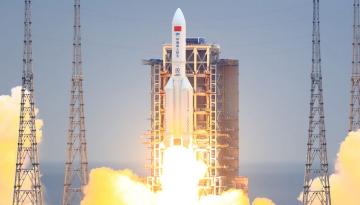A Harvard astrophysicist says China appears to have a blasé attitude when it comes to space junk, but it's highly unlikely its latest cast-off will hit anyone.
The Long March 5B rocket, which helped put a space station module into orbit at the end of April, is currently orbiting the planet at nearly 28,000km/h. At some point in the next week, however, it'll slow down thanks to atmospheric drag and plummet back to Earth.
Chinese government-run Global Times said the "thin-skinned" rocket would burn up in the atmosphere - but that's not what happened last year when a similar Chinese rocket was left to fall back to Earth on its own, pieces of it raining down in the Atlantic and on a west African village.
The current best estimate for when the current rocket, also known as CZ-5B, will hit the atmosphere is Sunday 2:34pm, plus or minus 21 hours. Orbiting every 90 minutes, where it will land is anyone's guess - New Zealand is in its flight path.
Aside from saying it will burn up, China has been tight-lipped on what exactly is going on with the rocket.
But Jonathan McDowell of the Harvard-Smithsonian Center for Astrophysics says Kiwis shouldn't be losing any sleep over it.
"I think it is more likely than not that it will fall in the Pacific Ocean and everyone will go, 'Why was everyone excited?'" he told The Independent.
"Just because of the area, it is really just a question of what fraction of the Earth's surface is covered by people and stuff."
Only about 3 percent of land is urban, and land only accounts for less than a third of the Earth's surface.
Dr McDowell estimates any individual person has a "one in several billion chance" they'll be hit.
"You should not lose an iota of sleep on this, do not worry on a personal level, it is not going hit you. There are many more things that are likely to take you out than this."
He said China has a "very different attitude to western space powers in letting rockets fall back to Earth". Whereas most space-faring countries try to land junk in the Pacific Ocean's spacecraft cemetery or plot trajectories ensuring it will burn up, China doesn't seem to think that's important.
"They are just taking the view that 'yeah, we were fine last time, no-one was killed, we hit a few houses, what is the worry?'"
From their view, he said, uncontrolled re-entry is an improvement - they used to drop used rockets on their own land, and "you would regularly get these videos of people in a village downrange from the launch site with a rocket stage sticking out of their barn leaking toxic propellant".
The 21-tonne, 30m rocket is more than twice the size of a Chinese space station module that made headlines in 2018 when it came down near Tahiti.
The US says it is tracking the rocket, but its point of reentry won't be known until just hours beforehand.





